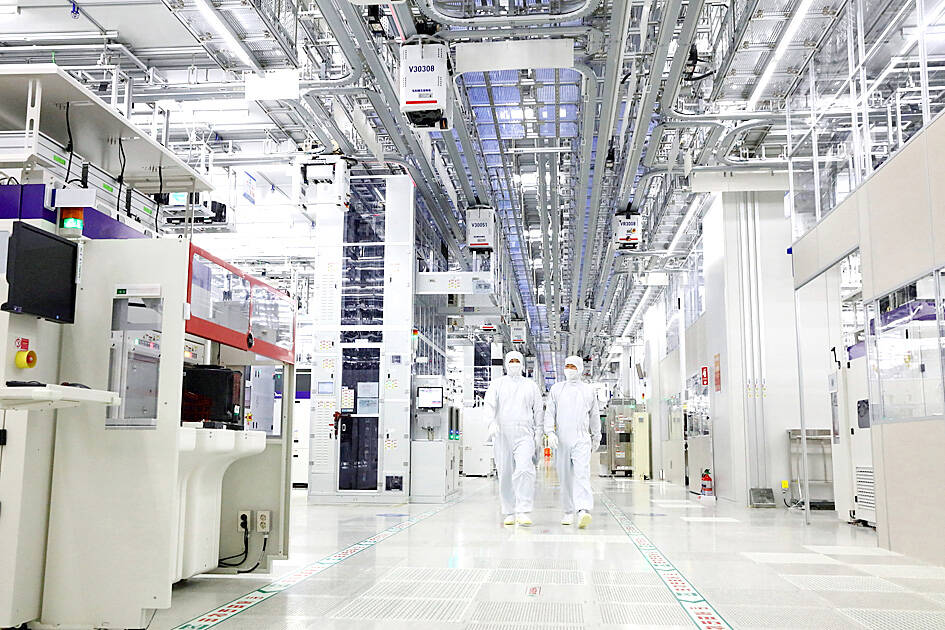South Korea expects Washington to extend a waiver on the shipment of advanced chipmaking equipment to China, allowing SK Hynix Inc and Samsung Electronics Co to get the equipment they need to maintain operations in the world’s second-biggest economy.
A one-year waiver due to expire in October is expected to be extended “for a considerable period of time,” South Korean Minister of Trade, Industry and Energy Lee Chang-yang said yesterday.
Such a move would clear up a major uncertainty for South Korean chipmakers concerned about the future of their biggest overseas manufacturing bases.

Photo: Reuters / Samsung Electronics
Samsung and Hynix are the world’s largest memorychip makers, essential for most devices from computers to smartphones and vehicles.
South Korean officials have told their US counterparts that the Asian nation’s companies should be allowed to maintain operations in China to avoid disrupting the global chip supply chain, Lee told reporters at a briefing in Seoul.
Washington last year imposed a series of trade curbs on China that limited its access to advanced technology, including semiconductor manufacturing and chipmaking machinery. It granted a one-year waiver on those sanctions to South Korean memorychip makers including Samsung and Hynix.
Hynix has said that it is considering various options for its operations in China, but is not expecting significant changes for now. The chipmaker said last month it was positive on receiving an extension of the waiver.
Aside from export curbs, Washington also imposed restrictions on prospective China investments for any chipmakers hoping to receive federal funds through its Creating Helpful Incentives to Produce Semiconductors and Science Act. Samsung is among those firms as it is building a Texas chip plant that could benefit from US subsidies.

Taiwan Semiconductor Manufacturing Co (TSMC, 台積電) would not produce its most advanced technologies in the US next year, Minister of Economic Affairs J.W. Kuo (郭智輝) said yesterday. Kuo made the comment during an appearance at the legislature, hours after the chipmaker announced that it would invest an additional US$100 billion to expand its manufacturing operations in the US. Asked by Taiwan People’s Party Legislator-at-large Chang Chi-kai (張啟楷) if TSMC would allow its most advanced technologies, the yet-to-be-released 2-nanometer and 1.6-nanometer processes, to go to the US in the near term, Kuo denied it. TSMC recently opened its first US factory, which produces 4-nanometer

GREAT SUCCESS: Republican Senator Todd Young expressed surprise at Trump’s comments and said he expects the administration to keep the program running US lawmakers who helped secure billions of dollars in subsidies for domestic semiconductor manufacturing rejected US President Donald Trump’s call to revoke the 2022 CHIPS and Science Act, signaling that any repeal effort in the US Congress would fall short. US Senate Minority Leader Chuck Schumer, who negotiated the law, on Wednesday said that Trump’s demand would fail, while a top Republican proponent, US Senator Todd Young, expressed surprise at the president’s comments and said he expects the administration to keep the program running. The CHIPS Act is “essential for America leading the world in tech, leading the world in AI [artificial

REACTIONS: While most analysts were positive about TSMC’s investment, one said the US expansion could disrupt the company’s supply-demand balance Taiwan Semiconductor Manufacturing Co’s (TSMC, 台積電) new US$100 billion investment in the US would exert a positive effect on the chipmaker’s revenue in the medium term on the back of booming artificial intelligence (AI) chip demand from US chip designers, an International Data Corp (IDC) analyst said yesterday. “This is good for TSMC in terms of business expansion, as its major clients for advanced chips are US chip designers,” IDC senior semiconductor research manager Galen Zeng (曾冠瑋) said by telephone yesterday. “Besides, those US companies all consider supply chain resilience a business imperative,” Zeng said. That meant local supply would

BIG INVESTMENT: Hon Hai is building the world’s largest assembly plant for servers based on Nvidia Corp’s state-of-the-art AI chips, Jalisco Governor Pablo Lemus said The construction of Hon Hai Precision Industry Co’s (鴻海精密) massive artificial intelligence (AI) server plant near Guadalajara, Mexico, would be completed in a year despite the threat of new tariffs from US President Donald Trump, Jalisco Governor Pablo Lemus said. Hon Hai, also known as Foxconn Technology Group (富士康科技集團), is investing about US$900 million in what would become the world’s largest assembly plant for servers based on Nvidia Corp’s state-of-the-art GB200 AI chips, Lemus said. The project consists of two phases: the expansion of an existing Hon Hai facility in the municipality of El Salto, and the construction of a